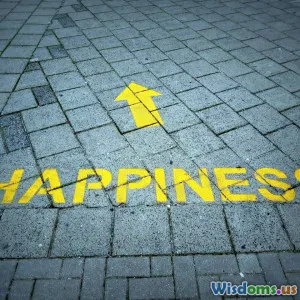
Are Relationship Struggles Hiding A Lack Of Self Love
8 min read Explore how lack of self-love can manifest as relationship struggles and learn strategies to nurture both personal worth and healthier partnerships. (0 Reviews)
Are Relationship Struggles Hiding a Lack of Self Love?
Relationships can be both the source of our greatest joys and deepest frustrations. It’s a paradox many of us know intimately: why does love sometimes feel like a battlefield? Behind persistent fights, miscommunications, and emotional distance, there may lie a less obvious culprit—our own relationship with ourselves. Could struggles with self-love be underpinning the issues that arise with our partners?
This article dives deep into the connection between relationship challenges and self-love deficiencies, offering evidence, expert insights, and practical advice aimed at fostering healthier bonds—from the inside out.
Understanding the Foundation: What is Self-Love?
Self-love is often misunderstood as simple self-appreciation or indulgence. But psychological research shows self-love extends far beyond that—it encompasses self-awareness, self-compassion, and acceptance of our authentic self, including flaws and past mistakes.
Dr. Kristin Neff, a leading researcher in self-compassion, defines it as “being kind and understanding toward oneself in instances of pain or failure rather than being harshly self-critical.” This kind of emotional nurturing is essential because without it, our views of ourselves become shaky and dependent on external validation.
Why is self-love foundational to healthy relationships? Because your subconscious idea of your own worth sets the tone for how you allow others to treat you and how you perceive their love.
Signs Relationship Struggles May Reflect Lack of Self-Love
Although every relationship experiences ups and downs, certain patterns can hint that underlying self-love is insufficient:
1. Excessive Need for Reassurance
If you find yourself constantly seeking your partner’s validation just to feel okay, it suggests an internal void. This means your self-worth is tethered to external affirmation rather than stemming from within.
For example, partners who repeatedly question "Do you still love me?" or depend on continual compliments can unknowingly place emotional burdens on their loved ones.
2. Patterns of Jealousy and Insecurity
Insecurity rooted in self-doubt can manifest as jealousy, controlling behavior, or suspicion. According to a study published in the Journal of Social and Personal Relationships, individuals with low self-esteem often perceive threats where none exist, fueling relational tension.
3. Difficulty Setting Boundaries
When someone lacks self-love, setting healthy boundaries feels threatening because saying no or asking for respect can trigger feelings of unworthiness or fear of abandonment.
4. Tolerating Unhealthy Dynamics
A lack of self-love may cause people to stay in toxic or unhealthy relationships longer than they should. They might believe they don't deserve better or fear being alone.
5. Conflicts Centered on Individual Validation
Many conflicts arise not solely from external circumstances but from emotional needs that go unmet—often a call for acceptance and love that hasn’t fully developed internally.
Real-World Examples
Case Study: Sarah and Tom
Sarah frequently found herself questioning Tom’s faithfulness despite his open communication and trustworthiness. This led to constant arguments and distance in their marriage. Therapy revealed Sarah’s history of childhood neglect impacted her ability to trust and love herself, causing her to project insecurities onto Tom. Addressing self-love through counseling significantly improved their relationship.
Celebrity Insights
Author and speaker Brené Brown has famously noted, “Owning our story and loving ourselves through that process is the bravest thing that we’ll ever do.” Many celebrities have discussed how their struggles in relationships were healed only after building self-compassion.
How Lack of Self-Love Develops and Why It’s Hidden
Our early life experiences, cultural messaging, and personal failures can erode self-love. Factors include:
- Childhood emotional neglect or criticism leading to internalized feelings of unworthiness.
- Societal pressures and unrealistic expectations about appearance, success, and relationships.
- Traumas and failures improperly processed or forgiven.
Often the lack of self-love hides behind coping mechanisms such as people-pleasing, perfectionism, or avoiding vulnerability—all of which strain relationships over time.
Pathways to Healing: Cultivating Self-Love to Improve Relationships
1. Self-Awareness and Reflection
Journaling or therapy can uncover limiting beliefs about yourself and how these influence your relational patterns.
2. Practice Self-Compassion
Following Kristen Neff’s framework, when facing setbacks, replace harsh self-criticism with kindness. For instance, instead of saying "I'm not good at love," try "I’m learning and growing every day."
3. Set Healthy Boundaries
Learning to say no and share your needs openly communicates self-respect and paves the way for mutual respect with partners.
4. Engage in Self-Care That Supports Emotional Wellbeing
Activities like mindfulness meditation, exercise, or hobbies that foster joy can strengthen your connection with self.
5. Couples Therapy with a Focus on Self and Relational Growth
When both partners engage in understanding their individual insecurities and shared dynamics, progress is amplified.
The Positive Ripple Effect of Enhanced Self-Love
Research by psychologist Nathaniel Branden demonstrates that increased self-esteem correlates with better interpersonal skills, improved communication, and higher relationship satisfaction.
Couples often report that a foundation of healthy self-love unleashes emotional availability, empathy, and deeper intimacy.
Conclusion: The Journey Within is Key to Relationship Harmony
Relationship struggles are rarely isolated phenomena. They echo the inner dialogues we have with ourselves—often revealing our deepest vulnerabilities and unmet needs. Lack of self-love can disguise itself as external conflict, making it crucial to turn inward first.
By embracing self-worth, practicing compassion, and addressing emotional wounds, individuals not only enrich their own lives but lay the groundwork for healthier, happier relationships. As the ancient wisdom goes, you cannot pour from an empty cup—fostering self-love is not selfish; it is essential.
Start today by acknowledging your intrinsic value, refining your self-care, and transforming how you relate not only to yourself but to those you love.
References
- Neff, K. (2011). Self-Compassion: The Proven Power of Being Kind to Yourself. William Morrow.
- Branden, N. (1994). The Six Pillars of Self-Esteem. Bantam.
- Journal of Social and Personal Relationships, various studies on self-esteem and relationships.
- Brown, B. (2012). Daring Greatly. Gotham Books.
Rate the Post
User Reviews
Popular Posts
















